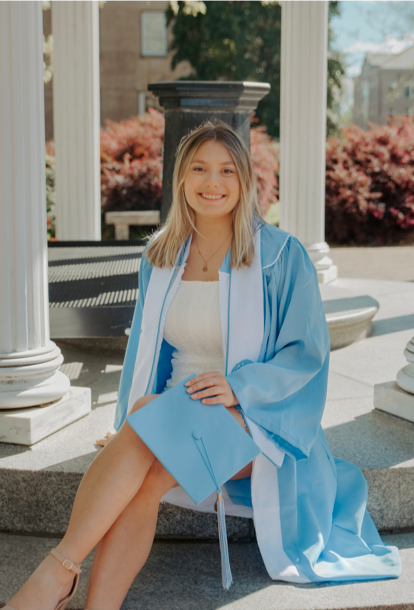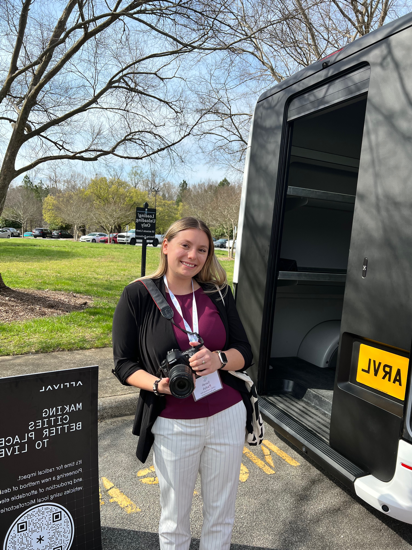By Sarah Padyk

A proud double Tar Heel in the making, Sarah Padyk is a master’s student at UNC-Chapel Hill in the Hussman School of Journalism and Media, studying strategic communication. She graduated with distinction in May of 2022 with a bachelor of science in environmental science with a concentration in quantitative energy systems. During her undergraduate career, she was involved with Honors Carolina, student government, interned for the UNC Institute for the Environment and worked with the North Carolina chapter of The Nature Conservancy. As a graduate student, she is the lead teaching assistant for ENEC 201, taught by Professor Greg Gangi. She is also a communications intern for the North Carolina Collaboratory. Sarah hopes that one day her career will give back to the communities that raised her, hoping to address energy issues in rural Appalachia.
Since I was young, I knew that I loved two things: writing and being outside. When I applied to Carolina, it was a no-brainer to check the small box that asked if I wanted to be considered for the environment and science communication dual degree (ESC) program.
In the five years that have followed that decision, the ESC program has shaped my college experience. The dual degree allowed me to combine what many would consider very different disciplines: environmental science and public relations. The ESC program fosters a unique perspective on relevant problems our world faces, allowing students to study the science behind environmental issues and develop the communication skills to persuasively present solutions.
The program typically consists of a Bachelor of Arts or a Bachelor of Science in environmental studies or environmental science, paired with any minor. Though many ESC students choose to minor with the Hussman School of Journalism and Media, the program only requires that students take three required classes in the Hussman School before officially applying to the master’s program junior year.
After successfully applying to the master’s program, the three other ESC students in my cohort and I began taking graduate-level classes our senior year. By the time I graduated from undergrad, I had completed one semester of graduate school.
The ESC program opened many doors for me throughout my time at Carolina. Once I chose to major in environmental science, I had the opportunity to spend a month in Asia on a Burch Research Seminar with Professor Greg Gangi, who is still a central mentor in my life today. This experience made me decide to shift my focus within my major to renewable energy systems.

The connections I made through the ESC program and my studies created a unique, niche area that allowed me to do many communication projects in and out of the classroom. In my senior year, I interned with UNC Institute for the Environment, and I got to take photos at the UNC Cleantech Summit, the largest clean energy conference in the Southeastern United States.
The ESC program fosters a unique perspective on relevant problems our world faces, allowing students to study the science behind environmental issues and develop the communication skills to persuasively present solutions.

Now that I am in the graduate program, three other ESC students and I have connected with the two cohorts of other graduate students we take classes with. In the graduate program, we can explore career interests outside of environmental areas. This semester, three of us competitively crafted and won a campaign pitch for the Nashville Predators, a National Hockey League team.
However, all four of us continue to dive deeper into environmental communications. We are all taking a green labs class next semester focused on environmental marketing. I am also working with faculty in the Hussman School and the Environment, Ecology, and Energy Program at UNC to craft an environmentally focused thesis that explores misinformation about renewable energy. This May will conclude my time taking classes at UNC-Chapel Hill, and I will spend my final fall semester in 2023 completing and defending my thesis.
This dual degree allowed me to pursue and develop my passions, and it is a way to establish yourself as a translator between cutting-edge science and policy and the people those developments impact. I cannot recommend it enough.
For more information about this program, please visit the ESC website or reach out to Ann Schmidt.

